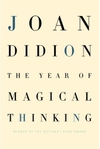 There is a television show on, with Joan Didion (whose work I love so much) talking about her book The Year of Magical Thinking, about the year after her husband and daughter died. I was a bit surprised, however, when she said that part of why she wrote the book was because she couldn't find anything to read about grieving and loss that she thought was helpful.
There is a television show on, with Joan Didion (whose work I love so much) talking about her book The Year of Magical Thinking, about the year after her husband and daughter died. I was a bit surprised, however, when she said that part of why she wrote the book was because she couldn't find anything to read about grieving and loss that she thought was helpful.
That surprised me; there are a lot of books that do this brilliantly, and that help – C. S. Lewis' A Grief Observed; James Agee's A Death in the Family; Alvarez, Ariél, and of course Spurious' Blanchot. There are anthologies – the best being Mary Jane Moffat's lovingly constructed In the Midst of Winter, a collection of writings across a number of cultures and literatures that she wrote after the death of her own husband. Then there are so many poems that help one get through – aside from all of the famous ones I know that I get a lot from Hoffman's anthology of Japanese Death Poems; and then of course all of the books about suffering, like the various AIDS memoirs and novels, or Renate Rubinstein's brilliant journey through having MS, Take It and Leave It.
Perhaps she just meant none of these writings seemed quite to mean anything to her, which of course makes sense – she had to tell her own version of the story.
I remember seeing Jane Chambers' wonderful play Last Summer at Bluefish Cove, about a group of lesbian friends who share a cabin at a country lake – but one of them dies of breast cancer between acts I and II. They used Cris Williamson's music beautifully – deeply felt, deeply sad 'womyn's music'. It was in San Francisco, some time in 1984, after Reid's death (December 2, 1983 – that's one of the few dates in my life I never need to look up, I always know that one). I'd been depressed a lot in previous months, but hadn't really cried I think: I still remember coming home from seeing the play to my studio apartment, sitting down in the chair next to the bed, and completely disintegrating – that amazing feeling of collapsing into crying that is way beyond tears, that is sniveling, choking, where you're amazed at your own body's reactions, and a part of your mind sets itself aside to watch and make sure you can still breathe.
I was amazed at all this: and almost incredibly comforted – that I felt so strongly, that I could hit that emotional wall and keep going into it. Although I remained a bit fragmented, depressive, schizoid, as I still am today; and though I actually tended to respond to everything, ever after, as though I were some kind of widow(er), in a way that was too despairing, too wounded, and not particularly healthy; it showed me that I would, in a strange way, be all right – that I could really grieve....
Comments